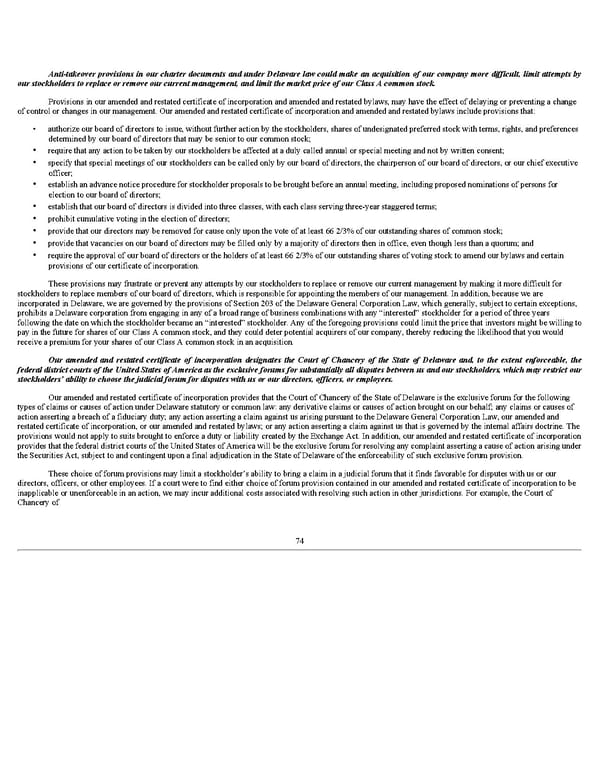Anti-takeover provisions in our charter documents and under Delaware law could make an acquisition of our company more difficult, limit attempts by our stockholders to replace or remove our current management, and limit the market price of our Class A common stock. Provisions in our amended and restated certificate of incorporation and amended and restated bylaws, may have the effect of delaying or preventing a change of control or changes in our management. Our amended and restated certificate of incorporation and amended and restated bylaws include provisions that: • authorize our board of directors to issue, without further action by the stockholders, shares of undesignated preferred stock with terms, rights, and preferences determined by our board of directors that may be senior to our common stock; • require that any action to be taken by our stockholders be affected at a duly called annual or special meeting and not by written consent; • specify that special meetings of our stockholders can be called only by our board of directors, the chairperson of our board of directors, or our chief executive officer; • establish an advance notice procedure for stockholder proposals to be brought before an annual meeting, including proposed nominations of persons for election to our board of directors; • establish that our board of directors is divided into three classes, with each class serving three-year staggered terms; • prohibit cumulative voting in the election of directors; • provide that our directors may be removed for cause only upon the vote of at least 66 2/3% of our outstanding shares of common stock; • provide that vacancies on our board of directors may be filled only by a majority of directors then in office, even though less than a quorum; and • require the approval of our board of directors or the holders of at least 66 2/3% of our outstanding shares of voting stock to amend our bylaws and certain provisions of our certificate of incorporation. These provisions may frustrate or prevent any attempts by our stockholders to replace or remove our current management by making it more difficult for stockholders to replace members of our board of directors, which is responsible for appointing the members of our management. In addition, because we are incorporated in Delaware, we are governed by the provisions of Section 203 of the Delaware General Corporation Law, which generally, subject to certain exceptions, prohibits a Delaware corporation from engaging in any of a broad range of business combinations with any “interested” stockholder for a period of three years following the date on which the stockholder became an “interested” stockholder. Any of the foregoing provisions could limit the price that investors might be willing to pay in the future for shares of our Class A common stock, and they could deter potential acquirers of our company, thereby reducing the likelihood that you would receive a premium for your shares of our Class A common stock in an acquisition. Our amended and restated certificate of incorporation designates the Court of Chancery of the State of Delaware and, to the extent enforceable, the federal district courts of the United States of America as the exclusive forums for substantially all disputes between us and our stockholders, which may restrict our stockholders’ ability to choose the judicial forum for disputes with us or our directors, officers, or employees. Our amended and restated certificate of incorporation provides that the Court of Chancery of the State of Delaware is the exclusive forum for the following types of claims or causes of action under Delaware statutory or common law: any derivative claims or causes of action brought on our behalf; any claims or causes of action asserting a breach of a fiduciary duty; any action asserting a claim against us arising pursuant to the Delaware General Corporation Law, our amended and restated certificate of incorporation, or our amended and restated bylaws; or any action asserting a claim against us that is governed by the internal affairs doctrine. The provisions would not apply to suits brought to enforce a duty or liability created by the Exchange Act. In addition, our amended and restated certificate of incorporation provides that the federal district courts of the United States of America will be the exclusive forum for resolving any complaint asserting a cause of action arising under the Securities Act, subject to and contingent upon a final adjudication in the State of Delaware of the enforceability of such exclusive forum provision. These choice of forum provisions may limit a stockholder’s ability to bring a claim in a judicial forum that it finds favorable for disputes with us or our directors, officers, or other employees. If a court were to find either choice of forum provision contained in our amended and restated certificate of incorporation to be inapplicable or unenforceable in an action, we may incur additional costs associated with resolving such action in other jurisdictions. For example, the Court of Chancery of 74
 Q3 2021 10Q Page 79 Page 81
Q3 2021 10Q Page 79 Page 81